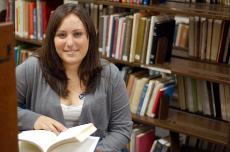Kinko’s founder shares his triumph over dyslexia

Courtney Weisman, senior in AHS, studies in the Undergraduate Library Thursday, Nov. 30. Like Orfalea, Weisman has a learning disability. Dan Hollander The Daily Illini
December 6, 2006
When Paul Orfalea, the founder of Kinko’s, came to speak at the Knight Auditorium on Nov. 8, he had much more to offer students than information about business ventures.
Though he has battled hyperactive dyslexia, Orfalea proved his determination to overcome the learning disability and ran a two-billion dollar company. He was chairperson for 30 years before retiring from his position.
After Courtney Weisman, senior in AHS, attended Orfalea’s speech, it reinforced her belief that college is a breeding ground for opportunities. Weisman grew up with three learning disabilities: dyslexia, short-term memory deficit and central auditory processing disorder, which causes problems with processing auditory information.
“I have been fortunate enough to have great professors at the University of Illinois,” Weisman said. “However, in my past schooling, I have had teachers who did not believe I had the potential to learn. One teacher even told me I should have a back-up plan for college because going to one was unlikely.”
The Academy for Entrepreneurial Leadership, better known as AEL, an organization which promotes entrepreneurial awareness and initiatives at the University, was the main organizer of Orfalea’s speech. Anthony Mendes, administrative assistant of AEL, said the main purpose of Orfalea’s speech was to motivate University students who have dyslexia and attention deficit disorders to pursue a career path in entrepreneurship. He said the AEL is exploring the strengths of dyslexics and their career paths.
Get The Daily Illini in your inbox!
“This research could lead to curriculum changes as we prepare our students for entrepreneurial careers. We were very fortunate to have Paul Orfalea on campus, not only to share his experiences through the ‘spotlight’ talk, but also to spend time with faculty and students who are dyslexic,” Mendes said.
According to the National Institute of Neurological Disorders and Stroke, dyslexia impairs certain reading abilities and is mainly brain-based. The learning curve of a person is also lower even though they may have normal intelligence. Common symptoms of dyslexia are difficulties with manipulating sounds and problems with rapid visual-verbal responses. Weisman, like Orfalea, still suffers from dyslexia.
As Weisman entered college she said she realized that having a disability did not mean she lacked intelligence. Her learning techniques were different than that of an “average” student, but she developed an innovative and unique approach to learning.
Over time, Weisman said she found efficient methods of studying involving muscle memory. She created hand signs similar to sign language in order to jog her memory.
Weisman said she is currently concentrating in rehabilitation and disability studies because of her own disability. When students ask Weisman whether she wished for a magic pill that would remove her disability, she said she would always say she would not take it. Weisman said that without this disorder, she would not have been the ambitious person she is today.
Weisman, like Orfalea, volunteers as a guest speaker as a way of reaching out to others and educating them about their disabilities. She said she feels that her speeches aid in inspiring and boosting the confidence of students with dyslexia or attention deficit disorders.
Karen Wold, a learning disabilities specialist at Disability Resources and Educational Services, said she believes that the main concern for students with learning disabilities is the prejudiced attitudes displayed by faculty and staff in college. Wold has been in her field for almost 20 years and feels that her only difficult task is to educate faculty and others about learning disabilities.
“They just believe that the student is lazy and is not trying hard enough,” Wold said.
Wold said she feels fortunate to help students grow and develop goals for the future.
“I work with some on study strategies that are targeted to maximize the use of their strengths and minimize the use of their weaker areas where their disabilities lie,” Wold said. “I also endeavor to help students understand how their disability impacts them and how they can use their strengths to compensate for their disabilities.”






